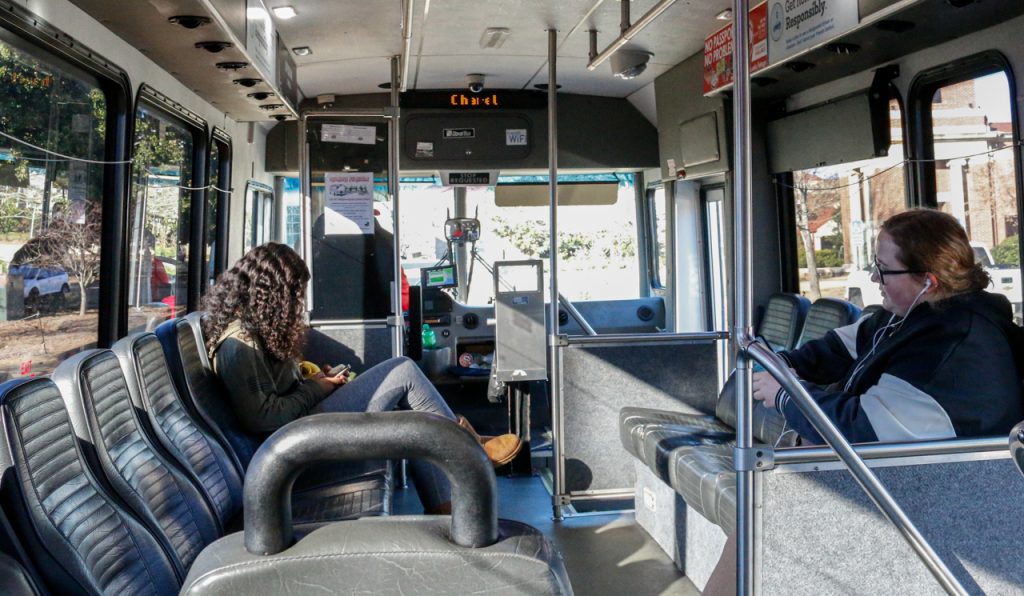Across the nation, undergraduate seniors are watching their final days of college life set on the horizon. At the University of Mississippi, graduation is a mere 13 days away. Next month, hundreds of thousands of college seniors across the country will toss their caps to the sky and step into a world that is just beginning to gain its footing again.

State and local governments have begun to treat COVID-19 as endemic. Mask mandates have been dropped and businesses are bringing their employees back to the office. No matter what their next step is — graduate studies, family life, professional school, entering the workforce, etc. — all of them are braving a new world.
Most of the students who will move their tassels this year graduated high school in 2018, in a world that is a far cry from the one we live in today. Their college experience is sliced neatly in half: before and after. Like all of us, these seniors are unwittingly overfamiliar with what it means to transition.
For MyKayla Williamson, the transition started long before the pandemic did.
“I am a first-generation college student from the small, rural southeast Mississippi town Waynesboro,” she said.
Waynesboro, east of Laurel and south of Meridian, has a population that is just one-fifth that of Oxford’s.
“Coming from a smaller, more rural space, I was navigating an entirely new social sphere. My first-year experience was filled with learning curves and adjustments. Nevertheless, I persisted,” she said. “ I realized early on that being a first-generation student from a lower-income home posed challenges.”
According to a report published by the U.S. Department of Education, a plethora of research shows that first-generation students face challenges in accessing and completing post-secondary education. Being the first to attend college, they cannot benefit from their parent’s experience attending college.
In absence of the “cultural capital” that the non-first-generation students that surrounded her had, Williamson paved her own way, quickly adjusting to the new environment and excelling.
“I joined clubs and organizations and sought out constructive programs that would provide mentorship. I learned to view myself as malleable and open to new experiences and critiques,” she said. “By the close of my sophomore year, I held leadership positions in many clubs and organizations that I joined as an eager freshman.”
Williamson’s sophomore year ended just as the pandemic began to tighten its grip on the nation. The smoke around the novel virus had cleared, revealing an impending crisis: COVID-19 was not just another flu.
By the end of spring 2020, the University of Mississippi had swiftly ceased in-person operations. Classes and finals were moved online. Students moved out of their dorms solemnly, with no fanfare.
On the other side of the state, in Starkville, Kerrigan Clark was wrapping up her freshman year at Mississippi State University.
“As for my experience overall, I think it was a tad underwhelming. I think that the pandemic had a really big impact on it due to the fact that a lot of things were canceled or moved online, and you just couldn’t get the full experience,” she said.
Like all of us, though, Clark found that living and being a student through the pandemic taught her a thing or two.
“I think one thing it really taught me was adaptability,” she said. “I was forced to learn new ways of doing things such as learning or just enjoying life overall.”
Williamson, too, marks the pandemic as having a distinct impact on her enjoyment of her college experience.
“COVID-19, of course, changed this newfound sense of belonging,” she said. “I was thrusted into a world of not speaking to many of my classmates that I was used to seeing simply because we never thought to exchange numbers or social media.”
Fast forward a few years later and both Williamson and Clark have more than overcome the challenges that greeted them at the onset of their college careers.
Williamson will be attending Cornell University to pursue a master’s in archaeology.
“I am fortunate to have the support of the prestigious National Science Foundation Graduate Research Fellowship Program in this endeavor,” she said. “I am the first student in Cornell’s MA in archaeology program to have the NSF Fellowship. I hope to make an impact in historical and African diaspora archaeology.”
Clark, too, is continuing her education with the hopes of making an impact.
“After graduation, I plan to continue my education at MSU pursuing a master of public policy and administration,” she said. “I hope to eventually get a job as a policy analyst and work for a nonprofit in the south.”
Clark, who is finishing her third and final year at MSU, is graduating a year early with the class of 2022. Her decision to do so was largely influenced by funding — college is expensive, and finishing early often means saving money in the long run. However, Clark believes there is value also in taking things slow.
“If someone is thinking about graduating early, I would probably tell them to reconsider. I think back over the past three years, and they went by so fast. So fast that I felt like I was always busy and I sometimes feel like I missed out on some ‘college experiences,’” she said. “Yes, school is so important, but I think I put my mental health on the backburner because I was so focused on getting to the next step to get out. And now that I’m about to be out, I’m honestly pretty anxious about it.”
Many people see graduating college as the first true step into “the real world,” as the entrance into a life devoid of flex dollars, spring break and date parties. It’s the first time you’re really alone in the world, without a safety net to be grateful for when you fall.
“In some ways graduation will be a step into adulthood with the gain of independence and confidence that come with having a bachelor’s degree,” Elizabeth Swindell, another member of the University of Mississippi’s class of 2022, said. “I am, however, apprehensive to transition into this new stage of life and constantly wonder if I am as prepared as I should be. It will also be difficult to have an ‘in between’ year before grad school which will stall my becoming an ‘official’ adult.”
Swindell, like many seniors, will take a gap year between graduation and professional school. After a year in Dallas, she will return to school and continue working towards her goal of becoming a physician’s assistant. Despite her anxieties about the future, she can look back on her time well spent at the university and offer a token of sound advice.
“I wish someone had emphasized how much of a growth experience college is. I think a lot of times professors, other adults and peers put too much pressure on students to be the perfect, well-rounded student when that isn’t where anyone starts,” she said. “College is for making and fixing mistakes and learning how to do better the next time.”
Many might say that perhaps, that is the essence of life in general.














